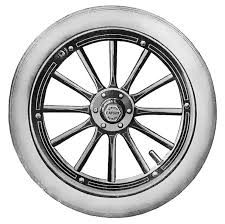中文词源
wheel 轮子
来自古英语hweol,轮子,来自PIE*kwel,转,圈,词源同cycle,collar。引申义轮子。
英语词源
- wheel
-
wheel: [OE] A wheel is etymologically simply something that ‘goes round’. It is a member of a large family of words that goes back to Indo- European *qweqwlo-, which was derived from *qwelo- ‘go round’. Other members include Greek kúklos ‘circle’ (source of English cycle), Sanskrit cakrá- ‘circle, wheel’ (source of English chukker), Serbo-Croat and Czech kolo ‘wheel’, and Russian koleso ‘wheel’. Its prehistoric Germanic descendant was *khwekhula, which evolved into Dutch wiel, Swedish and Danish hjul, and English wheel.
=> chukker, cycle, encyclopedia - wheel (n.)
- Old English hweol, hweogol "wheel," from Proto-Germanic *hwewlaz- (cognates: Old Norse hvel, Old Swedish hiughl, Old Frisian hwel, Middle Dutch weel), from PIE *kw(e)-kwl-o- "wheel, circle," suffixed, reduplicated form of root *kwel- (1) (see cycle (n.)).
The root wegh-, "to convey, especially by wheeled vehicle," is found in virtually every branch of Indo-European, including now Anatolian. The root, as well as other widely represented roots such as aks- and nobh-, attests to the presence of the wheel -- and vehicles using it -- at the time Proto-Indo-European was spoken. [Watkins, p. 96]
Figurative sense is early 14c. Wheel of fortune attested from early 15c. Slang wheels "a car" is recorded from 1959. Wheeler-dealer is from 1954, a rhyming elaboration of dealer. - wheel (v.)
- "to turn like a wheel," c. 1200, from wheel (n.); transitive sense attested from late 14c. Related: Wheeled; wheeling.
权威例句
- 1. He spun the steering-wheel so that we yawed from side to side.
- 他急速打着舵轮,把我们搞得摇来晃去的。
- 2. As the wheel turned, the potter shaped the clay.
- 轮子一边转动,制陶工人一边拉坯。
- 3. Catlett got behind the wheel and I sat in back.
- 卡特利特开车,我坐在车子后面。
- 4. Unauthorized vehicles will be wheel clamped or towed away.
- 未经许可停放的车辆将会被轮夹锁住或拖走。
- 5. The wheel had long since rusted from years of disuse.
- 多年不用的车轮早已锈迹斑斑。

